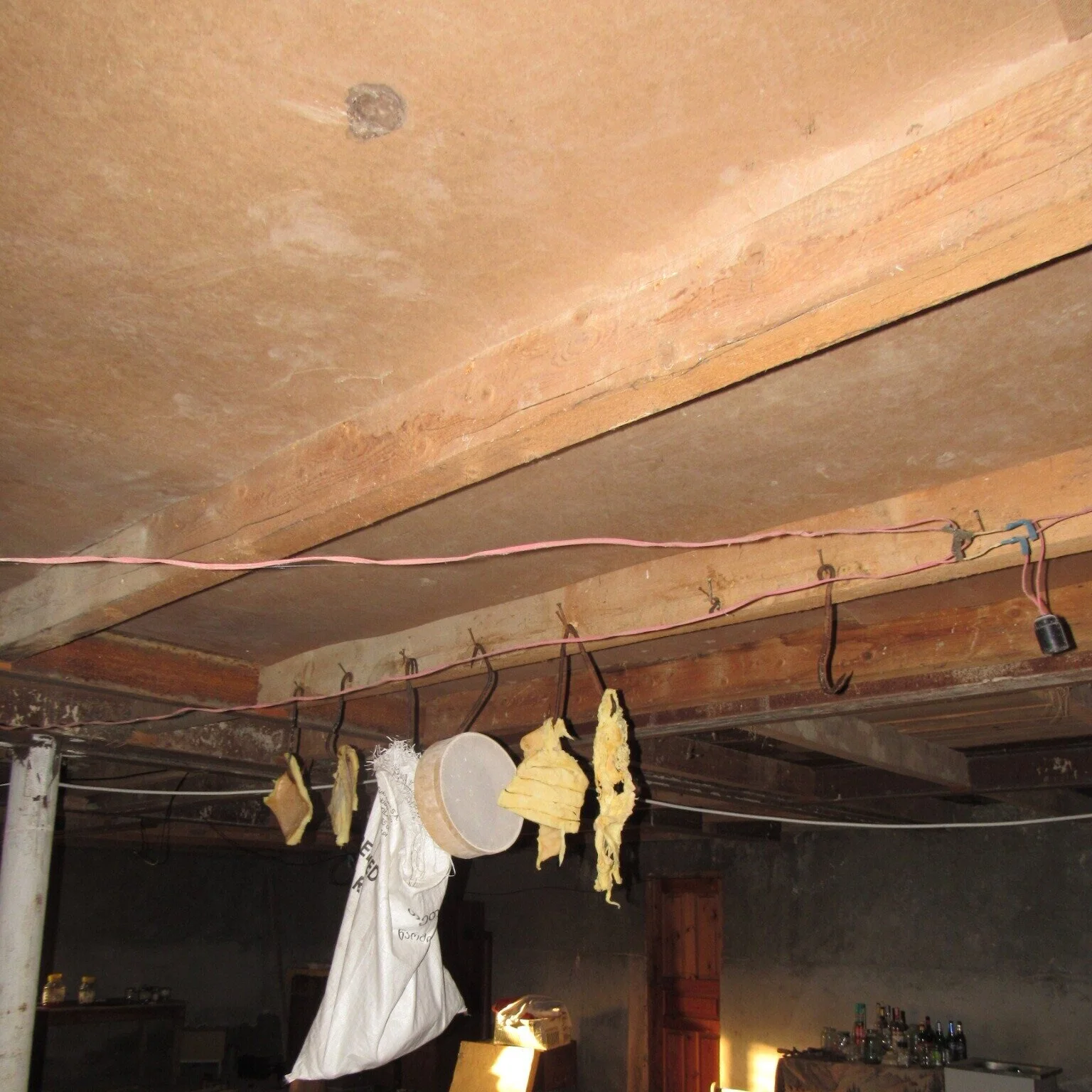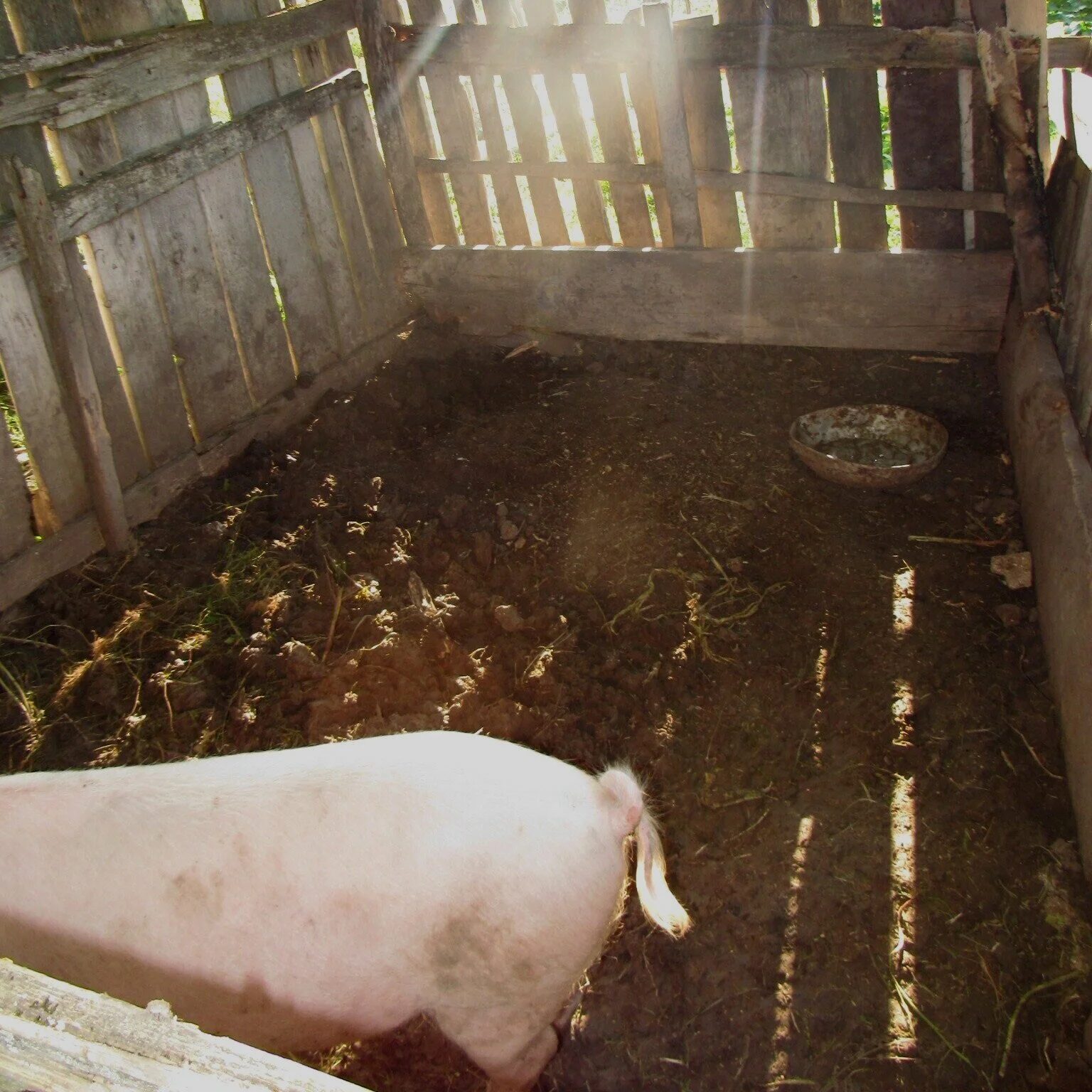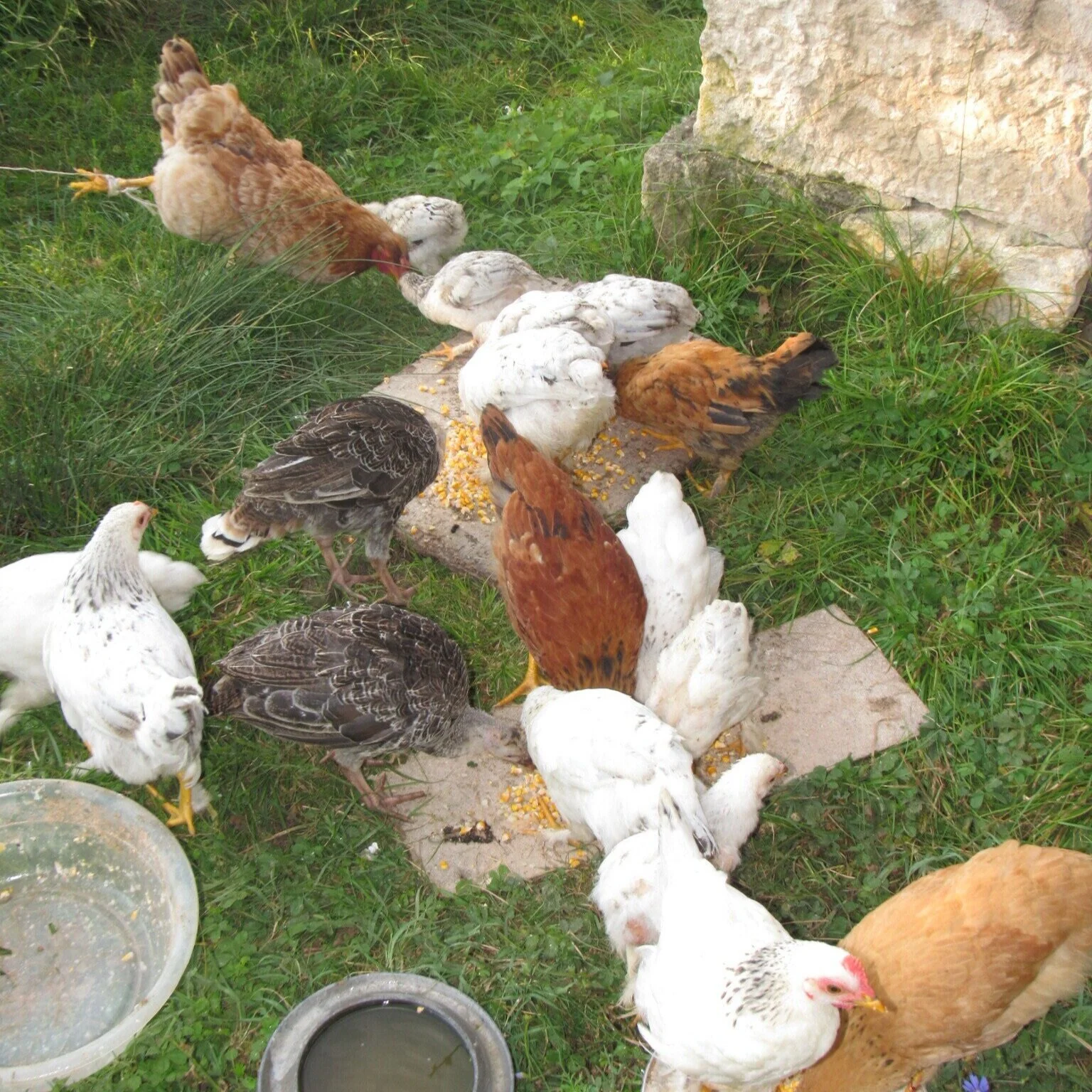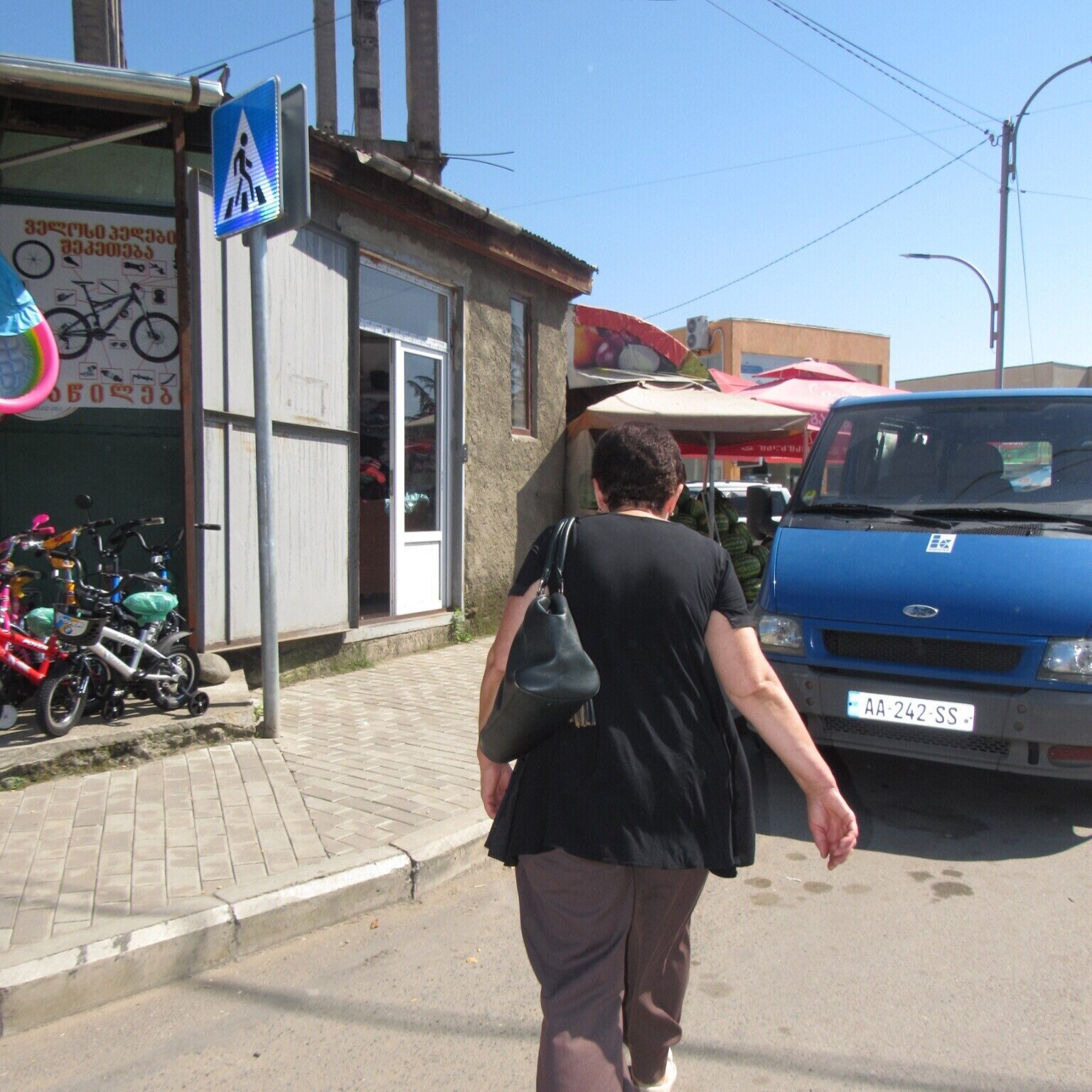Women I Love: Grandma and the Cow that Ate Too Much

Merjevi, Imereti Region, Georgia
August 13, 2019
By the time I get to her large, stone home in a small village of Merjevi, my grandmother has already woken up and suggests we drink coffee. I step into the long hallway spangled with bedrooms, kitchen, bathroom and a living room on each side. As always, my eyes go to the drawer on the right, adorned by photos of grandmother’s loved ones and the piano in the last room of the hallway. My mother has told me that there was a time when grandmother taught piano-lessons to young children but I have never personally heard her play or sing. It’s seven in the morning, she has a light white nightgown on and some slippers she’s possibly owned since the late 1980s. I notice her right foot is wrapped up, she’s unsure what exactly is bothering her there – something just is.
She makes coffee for herself, me, and her sister who has traveled down from a larger town in the Samegrelo region. They argue about cheese and whether the type we have in our kitchen will stretch enough to make the dish they’re planning on serving today. The menu is agreed upon, the coffee gets drunk. Grandma gives me my uniform for the day.
She puts on some long black socks that are ripped – which she brushes off with a chuckle – changes on the balcony, demanding I take no pictures during this particular procedure, and takes out some cheese from the milk substance she’s been keeping it submerged in overnight. I ask about four times what the liquid is for but she disregards me and heads down to the garden. She suggests I take photos of her beautiful red flowers and red trees while she heads into the cellar. Despite her protestations, I follow in and catch her dumping some stale bread into the milk-filled bucket.
I’ve been visiting this home with its farmland for several summers now. I love going to sleep here and I love waking up here even more. I’ve always known grandma had a lot to do throughout the day and little to no help from anyone around but it’s only this morning that I put on her hat and elastic pants, slip on some boots and head out to the fields after her.
Grandma refuses to hand over the bucket, claiming it to be too heavy for me. This, most likely, is true since I am convinced my grandmother could beat me in an arm-wrestle any day. We move towards the hungry yonks of a lone pig. He has no name, perhaps on purpose since the family is expecting him on the dining room table come December. Grandma loves him though; one can tell from the way she scolds the pig. She tells me that it’s been a long time since she’s watched her animals be butchered. She even mutters about her plans to keep all of her cattle around, for as long as possible.
Next up is a small wooden hut where a large cow awaits her morning meal and milking. She’s recently been through pregnancy and birth. A couple of months back grandma took on the habit of checking on the cow several times a night – knowing the birth to be approaching. She was alone with the cow that fateful night when half-blood and half a calf came out into her arms. The calf is tiny, scared of all humans except her and jumps around most hilariously as he follows us to his mother. This one has a name – “Kokhta” – translating roughly to “pretty little thing”.
Grandma gives the cow some dried grass as she milks her and I decide this to be the perfect time for questions. “Grandma, grandma, what would you do if you had a couple of weeks to do anything at all?” I ask with my best Red Riding Hood impersonation. “Sleep”, she replies simply. She claims that she’s not lazy to do anything as she scrapes up some manure off the floor and gives me a small knowing smile when I ask how much of the land is ours. “As much as your eyes can see” – she claims. It may be impressive but it seems sad when I remember she’s the sole caretaker of it all. The cow squirts some sort of fat last – for those of you who – like me – had no idea. Grandma lets me touch the saucers and that’s my first step at getting familiar with the big girl.
There’s no safety-net or a structure for farmers in Georgia, no reliable government for those working the soil. No wonder that young people – as grandma calls us – run away to the cities. “Our government is not for the people”, she says, and perhaps out of all the Georgians complaining, discussing, and fighting about politics, she knows this most. Grandma has three children and as she feeds the calf, she promises me that she’s never been upset about their drive towards city life. Grandma, herself never yearned for the capital. She studied animals from a young age and was working on a large, technologically advanced farm when times were different. She calls herself “genetically busy”.
Chickens are next. They seem – to me – to be the silliest and the most chaotic. One of them even has to have his leg tied to the fence. Grandma says he is too greedy and this is the only way other chickens manage to eat. I wonder aloud if times have become more difficult since my grandfather lost his lower leg. She chuckles. “Grandpa was never a farmer”, she says. He spent most of his time outside of the home, working in the town. Perhaps, he helps her out more now. When grandma's parents were alive, she had all the assistance she needed and it is since their passing that the workload has become heavy.
She does love her job though. She’s grateful for the meat, milk, butter, cheese, eggs, corn, beans, tomatoes, pickles, and fruit it provides. She says the first thing a human taking up farming needs is love. She talks to the chickens, fights with the pig, gets mad at the cow for not holding still. She sings as a constant – what exactly, I do not know. She jokes even, and when I point out how much the cow has eaten she responds with “Why do you think she’s called a cow?!”
Then we go to the vineyard where – to my surprise – cucumbers, grapes, and beans are growing on one land. I guess that is what nature does anyways. Here, grandmother tells me about her childhood. I have heard the story of her family before, but it’s fascinating nonetheless. When grandmother was born she was handed to her mother’s sister for raising and grew up with an aunt for a mother and a mother for an aunt. She holds no resentment though, only love for both of the women. We collect cucumbers and beans and some grass for the cow. It tires me considerably. I guess my yoga practice is no match for grandma’s work.
Now we rest. As we return to our balcony, it seems others have woken up as well. My mother bursts into laughter looking at my outfit. Grandpa picks apart the beans and we rest our legs and lie to our eyes (something Georgians say instead of ‘napping’). Grandmother embellishes my part in our morning’s work and I smile, shaking my head.
Hours pass and we pack into a car to go to the town bazaar where grandma takes out her retirement check of 150 Lari, equivalent to $50 at this time. This summer has seen the Georgian currency drop so significantly that I worry we’ll have to carry our money in suitcases soon enough. I worry but to grandma, it is what it is. She knows everyone at the bank, everyone at the shop, and almost everyone at the pharmacy. The woman she can’t quite place, she introduces herself to. On our way back, she even buys ice-cream for me.
By the time I leave that night, heading for the city again, I find her in the kitchen. She’s taking care of some cheese and she hates goodbyes. I step into the car, happy, sad, and damn sure that the next time I’m there, I’ll make her hand over the bucket of milk.






















